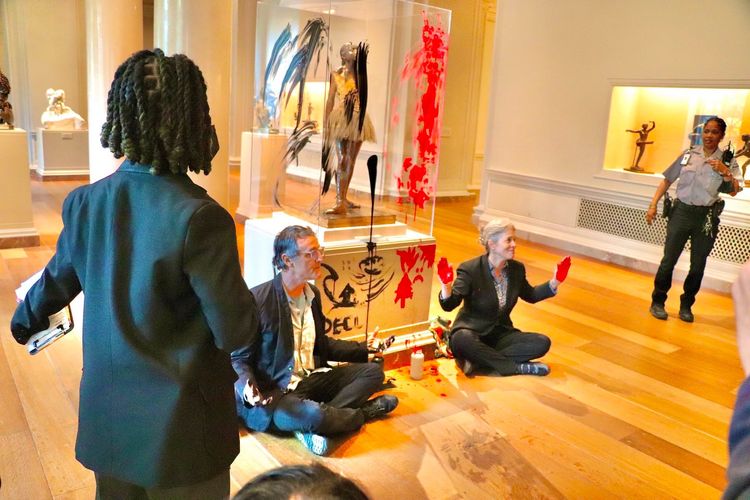More Fixable Than We Thought
Hey Y'all!
Sorry for leaving you hanging last week, especially after the release of the Big Climate Report. But your girls are tired! Mary just moved across the country, and Amy just buried her father (and wrote a beautiful essay about it in case you missed it). So, we're taking it easy this week too and letting our good friend Kate Marvel do most of the talking for us. She's an actual climate scientist, so Mary sat down with her to discuss the IPCC report and where we go from here. The path is more hopeful than any of us were expecting. We'll be back in full effect next week and, trust us, we have a lot to say!
It’s More Fixable Than We Thought with Kate Marvel
By Mary Annaïse Heglar
Q: What is the message from this month’s IPCC report to a newcomer to the climate conversation?
A: Basically: “welcome. We need you.” This can has been kicked down the road for so long that there are bad effects already happening and certain things are already locked in. But that does not mean that action does not matter and it does not mean that we cannot partially turn this thing around. So I think the message of the report is complex. You can't procrastinate for as long as we have. But it also says, look, the climate cares about how much carbon dioxide is in the atmosphere and you can be part of the solution. You can be part of the enormous group of people who are going to need to turn this thing around.
Q: And then what’s the message from this report to those of us who’ve been involved in climate work for a while?
A: So nothing in the report is new, by design. It would be super weird if scientists were surprised by this report because it would be like you weren't paying attention for the last however many years. But I think what is new, not in terms of new science, but in terms of new wording of the report, is it's really, really definite about the human contribution to climate change. Now, that is not a new thing. We have known that humans are causing all of global warming for quite a long time. But this is the first report that has used the word “unequivocal.” Something that I think is reflected in this report that's actually an advance in science is our ability to do rapid attribution. Now we can do very, very, very rapid assessment of how much climate change contributed to a particular event.
Q: So, the morning the report came out, you texted me and told me you actually saw hope in this report. This is probably one of the only instances in which you will allow me to ask you what gives you hope...so...what gives you hope?
A: I will use that word “hope” as a shorthand for optimism. So the report was very, very clear about what would happen theoretically if we stopped emitting greenhouse gases tomorrow... we could stop warming. If we began to draw them down, to take them out of the atmosphere, we could restore a lot of what was lost—not everything, I want to be really clear about that. But for a long time, we thought that carbon dioxide was forever. And it's true that carbon dioxide is very long lived in the atmosphere. That's why we care about cumulative emissions. But if we stop, we can really control this thing. So that was a theoretical thing that gave me hope. But I also think it's really important. And I think you and I have talked about this before, that it's important to hold two things in your head at the same time. One is obviously how far we have to go, but another is how far we've come.
We used to be on a trajectory for like four or five degrees warming with current trajectory business as usual. We're on track for about three degrees. Warming stated commitments will get us to like two and a half. I want to make it really clear I do not want to live in a world that is three degrees or two and a half degrees. That is not good enough, but it is going in the right direction. We just need to pull it down faster.
Rising Tides, Rising Temperatures
A billion children at ‘extreme risk’ from climate impacts, by Damian Carrington for The Guardian
It Rained at the Summit of Greenland’s Ice Sheet for the First Time Ever Recorded, by Dharna Noor for Earther
Saving the Ozone Layer Also Helped Buy Us Time to Address Climate Change, by Molly Taft for Earther
Western Drought Will Last Into Fall or Longer, by Henry Fountain for the New York Times
Colorado River Water Cuts Usher in the US Water-Shortage Era, by Brian Kahn for Earther
‘This is a very dangerous combination’: New study says wildfire smoke linked to increased covid cases, deaths, by Joshua Partlow for The Washington Post
The Dixie Fire Is Now the Largest Single Wildfire in California History, by Molly Taft for Earther
How climate change worsens extreme weather in your area, in one map, by Benji Jones for Vox
5 Big Takeaways From the New UN Climate Report Gizmodo by Dharna Noor for Earther
In a First, U.S. Declares Shortage on Colorado River, Forcing Water Cuts, by Henry Fountain for The New York Times
The IPCC Warns This Is a Make-or-Break Decade for Humanity by Brian Kahn and Dharna Noor for Earther
IPCC report: How UN climate scientists revolutionized extreme weather attribution By Umair Irfan for Vox
How climate change worsens extreme weather in your area, in one map by Benji Jones for Vox
The best-case climate scenario is going to be extremely hard by Zoya Teirstein for Grist
The Dixie Fire is moving too fast for California’s emergency alert systems by Joseph Winters for Grist
Death toll from floods in northern Turkey reaches 38, by Suzan Fraser for the LA Times
July was Earth's hottest month on record, NOAA says, by Seth Borenstein for the LA Times
UN report places new emphasis on climate tipping points by
Alexandria Herr for Grist
The Latest IPCC Report Is a Catastrophe By Robinson Meyer for the Atlantic
Europe's Hottest-Ever Temperature Was Just Recorded in Italy. Great, by Simon Childs for Vice
What We Must Finally Accept About the Climate Crisis, by Sara Schurmann and Bianca Ferrari for Vice
Satellite Images Reveal Evia Wildfire Destruction in Greece, by Andrew Couts for Earther
UN climate report: IPCC says humans caused “unequivocal” warming, by Umair Irfan and Rebecca Leber for Vox
Methane: The lesser-known greenhouse gas that's key to solving climate change, by Rebecca leber for Vox
How climate change could shift where tornadoes strike most, by Joshua Carroll for the Washington Post
Wildfires in Algeria Kill More Than 60 People, by Vivian Yee and Massinissa Benlakehal for the New York Times
The other greenhouse gas: UN report sets the record straight on methane, by Nathanael Johnson for Grist
Swedish mountain shrinks by two metres in a year as glacier melts, by Reuters Staff for The Guardian
The Climate Presidency
Biden's Tweets on Climate Change Do Not Match His Actions, by Kate Aronoff for The New Republic
Biden's infrastructure plan may bulldoze environmental justice concerns, advocates worry, by Dino Grandoni and Darryl Fears for the Washington Post
How the Economy Has to Radically Transform to End Fossil Fuels in 20 Years, by Nafeez Ahmed
Is Biden serious about climate? His 2,000 drilling and fracking permits suggest not by Wenonah Hauter for the Guardian
The Infrastructure Bill Is Divorced From the Reality of Climate Change, by Aaron Gordon for Vice
UN climate report raises pressure on Biden to seize a rare moment by Oliver Milman for the Guardian
Joe Manchin’s Lame Reason for Opposing More Infrastructure Spending, by Kate Aronoff for The New Republic
What’s Good and What’s Dangerous in the Bipartisan Infrastructure Bill, by Joan Walsh for The Nation
Amid Extreme Weather, a Shift Among Republicans on Climate Change, by Lisa Friedman and Coral Davenport for the New York Times
The planet is in peril. We’re building Congress’s strongest-ever climate bill, by Bernie Sanders for The Guardian
Climate Accountability
Playing Nice With the Fossil Fuel Industry Is Climate Denial, by Kate Aronoff for The New Republic
IPCC Calls for Major Methane Emissions Reductions for 1st Time by Molly Taft for Earther
Blue Hydrogen Isn't a 'Clean' Energy Source After All by Molly Taft for Earther
Exxon Kicked Out of Climate Group It Helped Form by Molly Taft for Earther
Shell Has to Pay $111 Million for 1970 Oil Spill That Turned Rain Black by Dharna Noor for Earther
The Lawyer Who Beat Chevron Has Been Found Guilty of Criminal Contempt by Dharna Noor for Earther
Methane: The lesser-known greenhouse gas that's key to solving climate change by Rebecca Leber by Vox
Playing Nice With the Fossil Fuel Industry Is Climate Denial by Kate Aronoff for The New Republic
The US doles out fossil fuel subsidizes so investors never lose by María Paula Rubiano A. for Grist
The World's on Fire, Yet Australia Keeps Pumping Out the Gas, by Royce Kurmelovs for Vice
Coverage of the “Code Red” Climate Report Was Good. Here’s How to Sustain It, by Andrew McCormick for The Nation
PG&E power line suspected in Dixie fire was set to be buried underground in safety move, by Alex Wigglesworth for the LA Times
The IPCC Understated the Need to Cut Emissions From Methane and Other Short-Lived Climate Pollutants, Climate Experts Say, by Phil McKenna for Inside Climate News
For Many, Hydrogen Is the Fuel of the Future. New Research Raises Doubts, by Hiroko Tabuchi for the New York Times
Lauren Boebert Forgot to Disclose Her Husband’s Nearly $1 Million in Gas Consulting Contracts, by Molly Taft for Earther
Stop the east African oil pipeline now, by Bill McKibben, Diana Nabiruma and Omar Elmawi for The Guardian
Justice is Justice is Justice
Parenting in the Age of Climate Change by Aaron Regunberg for The New Republic
The UN report is scaring people. But what if fear isn't enough? by Kate Yoder for Grist
Hidden Toll of the Northwest Heat Wave: Hundreds of Extra Deaths by Nadja Popovich and Winston Choi-Schagrin for the New York Times
Climate Change Is a ‘Hammer Hitting Us on the Head,’ Developing Nations Say By Lisa Friedman, Hiroko Tabuchi and Winston Choi-Schagrin for the New York Times
California Wine Country Towns Are Banning New Gas Stations, by Audrey Carleton
Glimmers of Hope
California Solar Panel Mandate for New Buildings Advances By Ivan Penn for the New York Times
Court Blocks a Vast Alaskan Drilling Project, Citing Climate Dangers, by Coral Davenport for The New York Times
The IPCC’s latest climate report is dire. But it also included some prospects for hope by Rebecca Solnit for The Guardian
Yes, the climate crisis is terrifying. But I refuse to abandon hope by Arwa Mahdawi for the Guardian
It's Too Soon to Admit Climate Defeat, by Georgia Wright for YR Media
In Philadelphia, Mass Transit Officials Hope Redesigning Bus Routes Will Boost Post-Pandemic Ridership, by Daelin Brown for Inside Climate News
IPCC's climate change report doesn't mean humanity is doomed, by Sarah Kaplan for The Washington Post
Good news: The media is getting the facts right on climate change, by Kate Yoder for Grist
Chlorpyrifos Will No Longer Be Allowed on Food Crops, by Coral Davenport for The New York Times
Laser Fusion Experiment Unleashes an Energetic Burst of Optimism, by Kenneth Chang for The New York Times
Climate in Culture
The IPCC Should Get Better at Climate Propaganda, by Liza Featherstone for The New Republic
If children are to live with the climate crisis, we must green the curriculum, by Merlyn Batchelder
Why Climate Deniers Invoke Arson as Cause of Wildfires So Often, by Molly Taft for Earther
Parenting in the Age of Climate Change, by Aaron Regunberg
Why These Environmental Activists Look Like Marvel Characters, by Bopha Phorn for Vice
Study of Earth's Deep Past Reveals Terrifying Global Warming Warning, by Becky Ferreira for Vice
11 novels that focus on climate change, by Brenda Haas for DW
At MoMA, Love of Cars Can Be Exhausting, by Jason Farago for the New York Times
Climate Change at Two California Vineyards, by Eric Asimov for the New York Times
The Long, Slow Drowning of the New Jersey Shore, by Andrew S. Lewis for the New York Times
Your Daily Coffee Habit Is About to Get More Expensive, by Coral Murphy Marcos
2020 US Census Shows Americans Are Moving to the Wrong Places, by David Sirota and Julia Rock for Earther
Whatever, Voice of Reason, by Tom Tomorrow for The Nation
Porgy: Sustainable, Cheap and Delicious on the Grill, by Florence Fabricant for New York Times Cooking
Plus More
Offshore turbines could be a windfall for the US steel industry by Emily Pontecorvo for Grist
For Many, Hydrogen Is the Fuel of the Future. New Research Raises Doubts.
By Hiroko Tabuchi for the New York Times
Coverage of the “Code Red” Climate Report Was Good. Here’s How to Sustain It. By Andrew McCormick for The Nation
‘Code red for humanity’: what the papers say about the IPCC report on the climate crisis by Helen Sullivan for the Guardian
Scientists Traced a Wooly Mammoth's Lifetime Journey, and It's Astonishing, by Becky Ferreira for Vice
IPCC report: How UN climate scientists revolutionized extreme weather attribution, by Umair Irfan for Vox
Why some animals are shrinking, by Christophe Haubursin for Vox
Dixie Fire evacuees share what they packed to flee Greenville, by Marlena Sloss and Marisa Iati for the Washington Post
Hermit crabs may be ‘excited’ by plastic pollution in ocean, researchers say, by Jennifer Hassan for the Washington Post
The US public schools redesigning buildings with climate in mind, by Maya Yang for The Guardian
How to Decode Hurricane Season Terms, by Karen Zraik and Christina Caron
How Superweeds Like Palmer Amaranth Are Changing Agriculture, by H. Claire Brown





Only paid subscribers can comment.
Please subscribe or sign in to join the conversation.